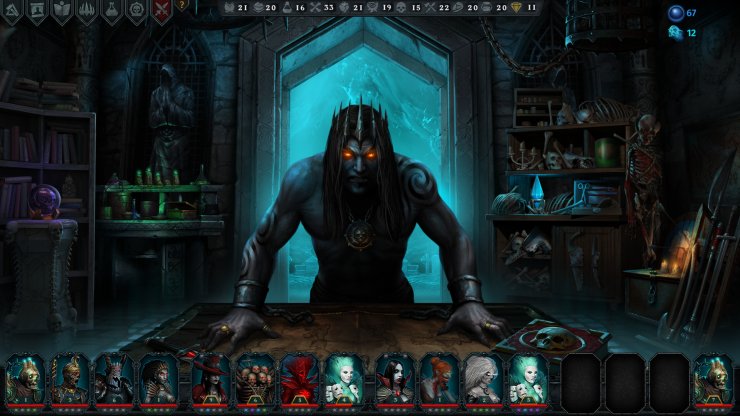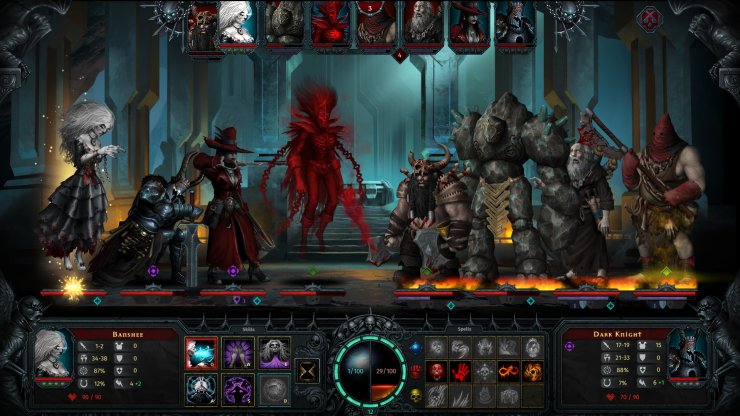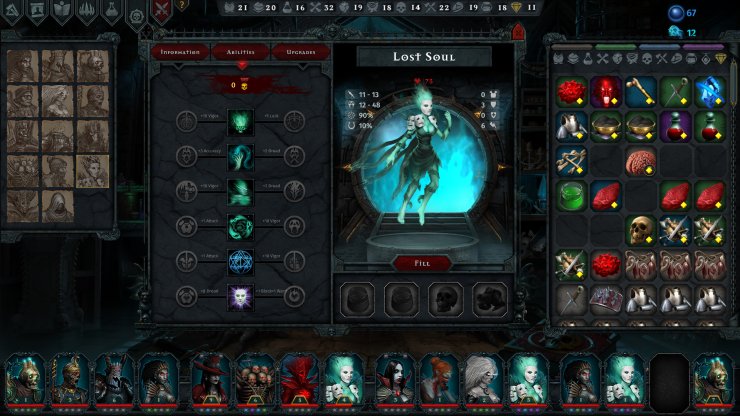Now, imagine playing Darkest Dungeon, but rather than becoming adventurers trying to combat fearsome monsters, you’re the monsters this time. That’s the idea behind Iratus: Lord of the Dead. In this PC turn-based strategy game, you take on the role of Iratus, a necromancer whose favorite activity is killing people to get body parts and use them to create monsters.
It’s clear that this game is heavily influenced by Darkest Dungeon with its strategy-focused combat, unforgiving difficulty, and side-on perspective. In term of visuals, however, it looks more like a title from Blizzard: a fantasy world with a dark theme, mythical magic, huge monsters, and an attractive interface.
Iratus: Lord of the Dead trailer
Being a powerful Dark Lord, Iratus doesn’t like to do the dirty work himself. Instead, he prefers to send his minions to carry out his wills. Whenever you kill a human, they will drop body parts, from limbs to organs to other bloody bits. Think of them as a kind of loot, but more disgusting. You can then use these as ingredients for your dark spells to summon foul beasts such as zombies, phantoms, banshees, dark knights, and vampires to serve you.
There is a very simple crafting interface for you to create these creatures, and you can improve the power of your minions by feeding them brains, which is (understandably) one of the most valuable parts that you can get from enemies.

Each monster has its own skill tree, which contains various powers, buffs, and other abilities. That said, they are disposable. Don’t freak out if you lose a monster, as you can easily summon another to take its place.
In actual gameplay, the mechanics are just like any other turn-based games. However, the depth of Iratus: Lord of the Dead lies in just how many abilities you have access to. A battle can play out in hundreds of way, with plenty of different damage types that you must take into account. Among these, there is a pretty interesting damage type: Stress.
Basically, certain monsters such as the banshee (the ghost of a woman in a tattered dress capable of unleashing screeching screams), are not exactly physically powerful, but they have the power to sap away at the very sanity of the enemies. If you inflict enough stress damage on an enemy, they will be driven mad and turn on their own allies.

Early grave
After each battle, Iratus can return to his hideout – a spooky, moonlit graveyard – to give his minions time to recover. He’s not completely evil after all. Moreover, you can use resources obtained in combat to establish new buildings to unlock more monsters. With every victory you descend deeper into a dungeon, eventually getting to the final boss. Developer Unfrozen claims that the process could take around 10 hours.

Iratus: Lord of the Dead is a roguelike game, so if you somehow end up with neither minions nor body parts to create new ones, that’s game over. The protagonist Iratus is voiced by actor Stephan Weyte, who gamers of the older generations might remember as the voice of Caleb, the main character of the Blood franchise. As expected, Weyte did a wonderful job of portraying Iratus as an evil villain who just revels in bad deeds. All in all, getting to play as the bad guy is a welcome breath of fresh air from the majority of games out there. You might ask, what’s his purpose? His motivation? Well, the answer is, nothing. He just likes to inflict death.
Iratus: Lord of the Dead doesn’t really make a lot of innovation. It just borrows ideas from other successful PC titles, and it isn’t even shy to admit it. Still, with a detailed monster system, a lavish visual style, and a steep learning curve, it is a game you should not miss out if you want a challenging turn-based strategy game.










Comments